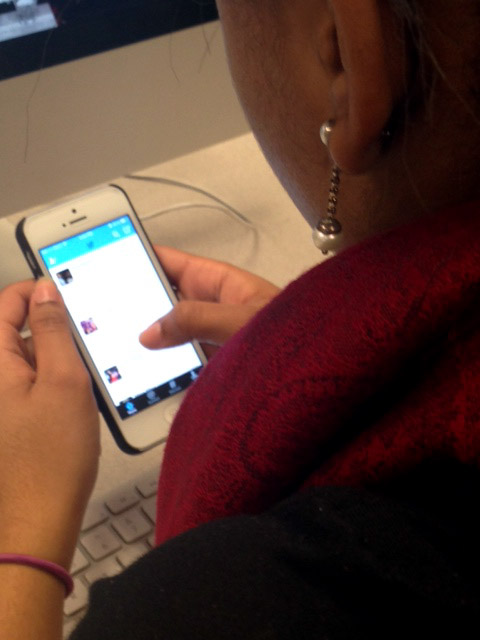Teens struggle living in a digital age
You are in class, and you notice that you still have an hour left in the period. Ever so slowly your teacher’s voice starts to drone on and lose you and you instinctively reach for your phone taking note of the glow that surrounds you as students try to hide their devices stealthily under their desks.
Welcome to generation Y.
We have our phones, computers, social media apps, eReaders, Kindles, iPads, iTouches, and now SMART Boards, Blackboard and online textbooks have been introduced.
Virtually submerged in a digital age, one cannot help but ask, does our use of technology help us or hinder us?
“[We are dumb], because we rely too much on technology,” sophomore David Park said. According to Mark Bauerlein in his book The Dumbest Generation, because teens do not get a “mental storehouse,” a foundation of knowledge is missing. Teens do not have a good understanding of history, literature, politics, economics and culture. Most of the time teens do not have a good background of knowledge and thus have a harder time understanding how new information learned fits into the context of the world and how it affects them. He explains that teenagers have a hard time putting new information together, like puzzle pieces, as this generation finds themselves having less of the puzzle already completed to fit it into.
“I would say that students nowadays have less background in knowledge, but again the other side of that is they do not have to spend time doing that, because the information is at their fingertips,” Spanish teacher and former AHS student Debbie Estes said. In his Pulitzer Prize nominated and highly acclaimed book, The Shallows, Nicholas Carr explains that the fast paced information on the Internet and incessant online distractions have shortened attention spans and have made it harder for teens to think deeply.
“Its not that it [technology] makes [teenagers] dumber, I just think they get lazy,” Estes said.
As for the benefits Estes said, “They just have everything at their fingertips… you have access to so much more information…It is so much easier to get different points of view and be able maybe to look at situation from all viewpoints.”
“Teenagers are not very prone to deep thinking as it is…. If you know all the information is always available then why bother committing it to memory,” technology specialist Jennifer Cory said, “Comparing students now to students that I grew up with, they would sit through class they might memorize the material to pass the test and then they would forget it. That’s pretty much how it is now. People are going to remember what they are interested in or applies to them and that’s whether or not they have access technology.”
Consequently, many argue that the rise of the digital age has sharpened the minds of students and those growing up in it.
“I think we are smart, because we have more knowledge on different things and use technology,” sophomore Amanda Adenan.
According to a recent Washington Post report, 78% of North Americans have access to the internet today, 30 percent more than the global average.
“The students that I know seem to be often more informed than I am, about current events. They definitely use their smartphones to learn,” Cory said.
But does this constant use still affect our thinking?
“As for not thinking deeply, that is so much of individual thing… I think there are some students who are very deep thinkers and have a much greater knowledge of world events and what’s going on because of the technology that is out there,” Estes said, “[However] I do not think students these days are as strong writers, because I think they rely too heavily on what others have written.”
If you have read this far, congratulations the Internet has made you completely unable to think and concentrate.

Andrew Peters has been part of the A-Blast since freshman year. This year, as a sophomore, Andrew is the In-Depth Editor. Andrew enjoys reading fiction...











